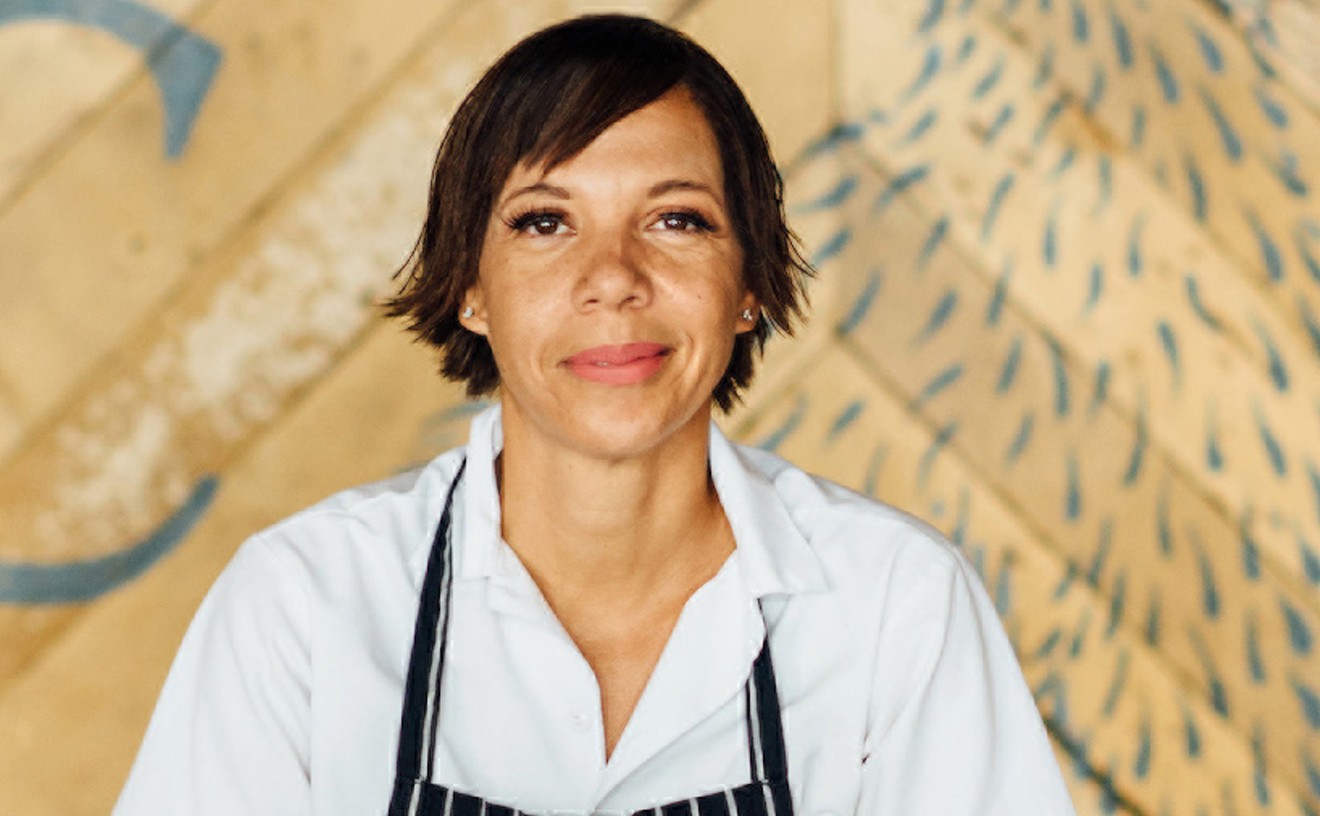Jeffrey Chen is a passionate craftsman. He's not much of a talker, but the few words he says hold substance. "American people have no patience." It is true -- patience is indeed a virtue, one that the Japanese have certainly mastered and is evident in Momi Gyoza Bar's signature dish: kamameshi hot pot rice. It takes 25 minutes to prepare, but its fixings -- which include pig ear, chicken heart, eel, or oxtail -- make it worth the wait.
In the meantime, chow down on one of the 12 dumpling, gyoza, and dim sum varieties that Chen kneads by hand, as he does with noodles at his neighboring ramen shop.
See also: Ramen Mania Sweeps Miami Restaurants
Momi was the city's first focused ramen shop. And with Momi Gyoza Bar, Chen is doing it again. He's taken over the former Prost spot, as well as the corner location that housed the longstanding but now-shuttered (as of January 1) Rosinella. Eventually, that will be Momi Wine & Sake Bar, which means Chen will have practically an entire block of Japanese cuisine amid Brickell's high-rises.
Like its sister restaurant, Momi Gyoza Bar is a cash-only operation. For those who shy away from dining here because their lives are ruled by plastic, Chen probably doesn't want your business anyway. His reason for not taking credit cards is simple: "All I want to do is cook." Worrying about POS systems and large credit card companies means less time for the creative mind to flourish. Instead, Chen would much rather go to the Home Depot for some steel pipes and metal house numbers to weld together.
This is what you'll get when you walk up to the counter at Momi Gyoza Bar and place your order. Then you'll take your number to one of the three communal tables and wait while drinking Japanese beer, sake, or tea. "You can't find these anywhere else," he says about his version of transponders. It seems to be the underlying theme for everything here, like the napa cabbage bone-marrow soup, priced at just $7.
The menu is split into five parts: veggie, a lonesome soup, dim sum, dumpling, gyoza, and kamameshi. Asked why just one soup, Chen simply says, "Have you been next door?" Touché.
You no longer need to drive out west to Tropical Chinese to get your fix of dim sum, because here you can have crystal shrimp har gao, shrimp shumai, and perfectly subtle wasabi pork shumai. Five pieces of any of the dim sum and dumpling varieties are affordably priced at $7 (remember, this is hand-kneaded dough). Do yourself a favor and ask for the house-made scallion-ginger sauce to dunk your dim sum.
Chen's favorite (and this writer's as well) is the pickled vegetable dumpling. Slivers of especially select royal wild vegetable are boiled and pickled with kelp juice before finding a home inside these feather-like pillows of steamed dough. In addition to the pickled vegetables, there are pork 'n' vegetable, chicken 'n' vegetable, shrimp 'n' pork, and seafood.
The seafood gyoza and dumplings pack a sashimi-grade select crabmeat, fish, and shrimp. It's up to your whether you want your seafood steamed (dumpling) or pan-seared (gyoza).
Gyoza is served by the dozen and costs a dollar a pop, so $12 for 12. You have the choice between pork belly, vegetable, chicken 'n' vegetable, or edamame. The last is made using edamame beans, but Chen isn't one to waste or throw anything away. He takes the skin along with the ground beans and mixes them with flour to create a green outer shell. Vegetarians will be very happy with this dish.
But the real winner and must-have item here is the hot pot rice, which Chen has single-handedly designed. He even built the contraptions (pot and general heating pad) in which the rice cooks. "Japanese have patience," he says while practicing it himself. It takes patience to pick and weigh 150 grains of rice, which is how much the hot pot takes. "Not one more and not one less. If you miss one, make one error, it throws the whole thing off and you'll have to wait again." Chen tried to cut the cooking time down to half but claims it was inconsistent. "We're not putting rice in a cooker and serving it with chicken." What he's creating is meaningful -- and delicious.
The Japanese have always cooked with igneous rock because of its volcanic nature and thus its resistance to magma. In this case, the rock holds down the lid so that the blazing charcoal underneath has a chance to fully permeate and cook the rice.
"It's not ready, " he says as he uncovers it and mixes it. "You need to let it simmer just a little bit longer to get the flavor." The flavor he's referring to in this case is the pig ear and takana. Alternatives include eel, oxtail, chicken, pork belly, Hong Kong sausage, and bacon, mushroom, and chicken heart (all of which are priced at $12). This, however, is Chen's favorite, probably because of the fatty and tender yet crisp texture and flavor that the pig ear lends to the rice. The leafy mustard greens cut the fat with subtle bitterness and pungent spice.
This dish is perfect in every way possible. "Could be better," Chen says. Perhaps that's why he has practiced nonstop before the official opening of Momi Gyoza Bar, which is today. Chen intends to open the restaurant 24 hours a day soon and offer Japanese porridge for breakfast, but for now he's perfecting his already-perfect offerings. So go get your dim sum and kamameshi on -- just make sure you have 25 minutes to spare. "If people can wait, great. If not, what can we do?"
Follow Carla on Twitter @ohcarlucha
Follow Short Order on Facebook, Twitter @Short_Order, and Instagram @ShortOrder.











